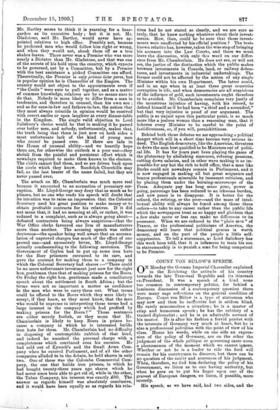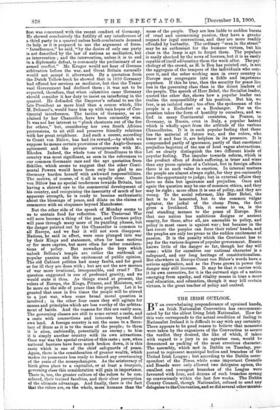COUNT VON BOLO W'S SPEECH.
ON Monday the German Imperial Chancellor explained in the Reichstag the attitude of his country towards the late Transvaal Republic and its itinerant ex-President. It was a speech of a kind none too common in contemporary politics, for behind a luminous discussion of a contemporary question there were many sage reflections on the general condition of Europe. Count von Biilow is a type of statesman who may now and then be ineffective but is seldom blind. He rarely misconceives a situation ; he is a master of crisp and humorous speech ; he has the subtlety of a trained diplomatist ; and he is an admirable servant of his master. He is after his fashion a fervid patriot with the interests of Germany very much at heart, but he is also a professional politician with the point of view of his class. Hence his words, while on one side an expres- sion of the policy of Germany, are on the other the judgment of the whole politique or governing caste neon a phenomenon of the moment which we cannot ignore. Whether or not he is a leader to ride the ford will remain for his countrymen to discover, but there can be no question of the sanity and acuteness of his judgment. When, therefore, we find him declaring the policy of his Government, we listen as to one having authority, but when he goes on to put his finger upon one of the gravest of European dangers, we listen, if possible, more intently.
His speech, as we have said, had two sides, and the first was concerned with the recent conduct of Germany. He showed conclusively the futility of any interference of a third party in a quarrel unless both combatants demand its help or it is prepared to use the argument of force. " Interference," he said, " by the desire of only one party is not described by the law of nations as mediation, but as intervention ; and the intervention, unless it is to end in a diplomatic defeat, is commonly the preliminary of an armed conflict." Mr. Kruger would not hear of German arbitration before the war, and Great Britain naturally would not accept it afterwards. By a quotation from the Dutch Yellow-book be showed that in 1899 Germany had offered her services as mediator, but that the Trans- vaal Government had declined them ; it was not to be expected, therefore, that when calamities came Germany should consider it her duty to insist on interfering in the quarrel. He defended the Emperor's refusal to see the late President as more kind than a course which, like M. Delcasse's, would buoy him up with vain hopes of Con- tinental interference. The tactics of Germany, as ex- plained by her Chancellor, have been eminently wise. It was not her interest to " pluck chestnuts out of the fire for others," but, considering her own South African pretensions, to sit still and preserve friendly relations with her great neighbour. And such a course, according to Count von Billow, has had its reward,—by which we suppose he means certain provisions of the Anglo-German agreement and the private arrangements with Mr. Rhodes. Indeed, the whole tone of friendliness to this country was most significant, as seen in the references to our common Germanic race and the apt quotation from Schiller, which seems to suggest that the other Conti- nental Powers would have been only too glad to see Germany burden herself with awkward responsibilities. The motive, of course, of it all is equally clear. Count von Billow has no special tenderness towards Britain, but having a shrewd eye to the commercial development of his country, and recognising the insecurity of much of her apparent strength, he is ready to become enthusiastic about the blessings of peace, and dilate on the claims of commerce with an eloquence beyond Manchester.
But the other side of the speech of Monday seems to us to contain food for reflection. The Transvaal War will soon become a thing of the past, and German policy will pass through many more of its puzzling phases, but the danger pointed out by the Chancellor is common to all Europe, and we fear it will not soon disappear. Nations, he said in effect, were once plunged into war by their Kings and statesmen, often for base motives or for mere caprice, but more often for sober considera- tions of policy. But nowadays the keys which unlock Bellona's temple are rather the outbreak of popular passion and the excitement of public opinion. The old Cabinet politics had many faults, and for good or for ill they are done with ; but are not the new movers of war more irrational, irresponsible, and cruel ? The question suggested is one of profound gravity, and we would state it thus. As things stand at present, the rulers of Europe, the Kings, Princes, and Ministers, will be more on the side of peace than the peoples. Let it be granted that once in five times the people will be stirred to a just war, when some broad moral question is involved ; in the other four cases they will agitate for causes and principles which are less worthy of the arbitra- ment of battle. And the reasons for this are easily seen. The governing classes are still to some extent a caste, and a caste with connections and interests beyond their own land. A foreign country is not the same to a Secre- tary of State as it is to the mass of the people; to them it is alien, unfriendly, potentially an enemy ; to him it is simply another country with its own attractions. Once war was the special creation of this caste ; now, when national barriers have been much broken down, it is this caste which is one of the chief safeguards of peace.
Again, there is the consideration of greater wealth, which makes its possessors less ready to hazard any overturning of the seats of the moneychangers. As the aristocracy of birth gives place to a capitalist, or at least a bourgeois, governing class this consideration will gain in importance. There is, too, the greater culture of the rulers to be con- sidered, their trained faculties, and their clear perception of the ultimate advantage. And finally, there is the fact that the rulers are, on the whole, more humane than the mass of the people. They are less liable to sudden bursts of cruel and unreasoning passion, they have a greater . respect for legal conventions, and they are more readily offended by barbarity. The ordinary "man in the street" may be an enthusiast for the humane virtues, but his class in the lump is apt to forget them. The populace is easily shocked by the news of horrors, but it is as easily capable of itself advocating them the week after. The psy- chology of the crowd, as M. le Bon has pointed out, is not the aggregate of the tempers of the individuals who com- pose it, and the sober working man in every country in Europe may congregate into a fickle and impetuous populace. If this be true, then the security for peace lies less in the governing class than in the direct leaders of the people. The speech of Herr Bebel, the Socialist leader, quoted the other day, shows how a popular leader can realise the responsibility of his position. But his, we fear, is an isolated case ; too often the spokesman of the people is a Rochefort or a Boulanger. For us the question takes the form of hostility to ourselves, and we find in many Continental countries, in France, in Germany, in Russia, even in Italy, a popular hatred which is wholly apart from the attitude of the various Chancelleries. It is in such popular feeling that there lies the material of future war, and the rulers, who know it and fear it, are helpless in its presence. It is compounded partly of ignorance, partly of that emotional prejudice begotten of the use of loud vague abstractions. Let us clearly distinguish the two different kinds of popular feeling. The impulse towards reform, which is the product often of dumb suffering, is truer and wiser than any pious opinion of a Cabinet, but in foreign affairs there is no such value in emotion. In internal matters the people are almost always right, for they pre-eminently have the opportunity to judge; but in external affairs they have no data but ignorance and prejudice. Once and again the question may be one of common ethics, and they may be right ; more often it is one of policy, and they are wrong. To the social reformer, like Herr Bebel, the fact is to be lamented, but to the common vulgar agitator, the jackal of the cheap Press, the fact gives a livelihood. This, it seems to us, is the real standing menace to the peace of Europe. Not that one nation has ambitious designs or ancient enmity, for these, after all, are amenable to policy, and policy in most cases is against war ; but because in the last resort the peoples can force their rulers' hands, and the peoples are only too prone to the sudden excitement of passion. It is the penalty which the Continent has to pay for the various degrees of popular government. Russia knows little of the danger so far, though her day will come ; while for ourselves our national character is a safeguard, and our long heritage of constitutionalism. But elsewhere in Europe Count von Billow's words have a serious application, and as the Press grows in power the danger may still increase. It may be that it carries with it its own corrective, for it is the outward sign of a nation emerging from apathy, and vitality means in time a more real education, and education, though it may kill certain virtues, is the great teacher of policy and controL















































 Previous page
Previous page